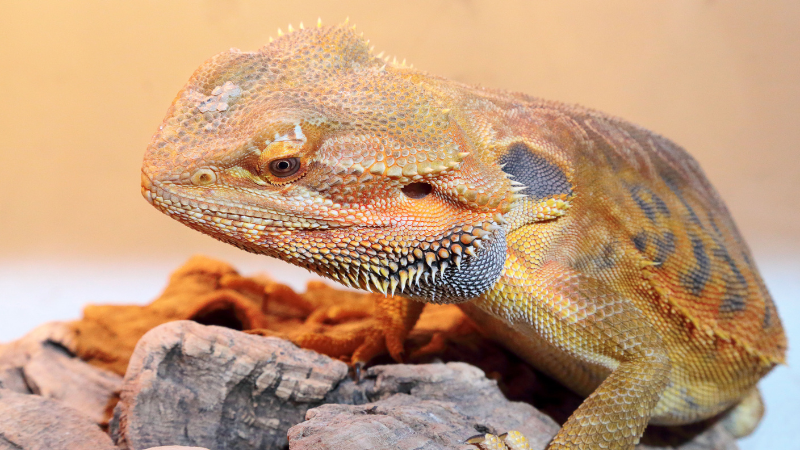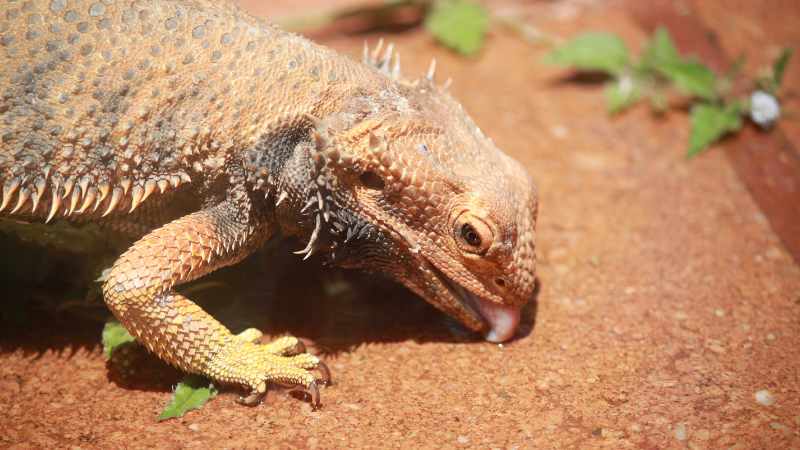Managing bearded dragon parasites at home can be done effectively with proper treatment methods. We will explore various treatment approaches to address these parasites and provide the necessary care for your bearded dragon’s health and well-being.
Understanding Bearded Dragon Parasites
Welcome to our comprehensive guide on managing and treating parasites in bearded dragons. Bearded dragons are popular reptile pets, known for their unique appearance and docile nature. However, like any other living creature, they can be susceptible to parasites. Understanding the types of parasites that affect bearded dragons and recognizing the signs and symptoms of infestations is crucial for their overall health and well-being.
Types Of Parasites That Affect Bearded Dragons
Bearded dragons can be affected by various types of parasites, which can range from internal to external infestations. Here are some common types of parasites that can afflict bearded dragons:
| Types of Parasites | Description |
|---|---|
| Endoparasites | Includes internal parasites like worms (such as roundworms, pinworms, and tapeworms), coccidia, and protozoa. These parasites can reside in the digestive system, causing various health problems. |
| Ectoparasites | Refers to external parasites such as mites, ticks, and fleas. These parasites can cause skin irritations, infections, and discomfort for your bearded dragon. |
| Blood Parasites | Includes parasites like Haemogregarine, which affect the red blood cells of bearded dragons. Severe infestations may lead to anemia and other complications. |
Signs And Symptoms Of Parasite Infestation
Recognizing the signs and symptoms of parasite infestations in bearded dragons is crucial for early intervention and effective treatment. Some common indications of parasite infestation include:
- Decreased appetite or weight loss
- Lethargy or decreased activity level
- Diarrhea or abnormal feces
- Regurgitation or vomiting
- Visible parasites or eggs in feces
- Itching, scratching, or visible skin irritations
- Swollen abdomen or bloating
- Anemia (pale gums, weakness)
If your bearded dragon displays any of these symptoms, it is important to consult a veterinarian specializing in reptiles. They can accurately diagnose the type of parasite and recommend appropriate treatment options.

Diagnosing Bearded Dragon Parasites
Discover effective home treatments for managing and treating parasites in bearded dragons. Learn how to diagnose and address this common issue to ensure your pet’s health and well-being.
Common Diagnostic Methods
Diagnosing bearded dragon parasites is an essential step in providing proper care for your scaly companion. There are several common diagnostic methods used to identify the presence of parasites in bearded dragons. By understanding these methods, you will be better equipped to detect and treat any potential issues that may arise.
One of the most effective ways to diagnose parasites in bearded dragons is through a fecal examination. This involves collecting a small sample of your dragon’s stool and sending it to a veterinarian for analysis. During the examination, the vet will look for any signs of parasites, such as eggs, larvae, or the parasites themselves. This method provides accurate results and helps identify specific types of parasites, enabling targeted treatment.
Aside from fecal examinations, another diagnostic method commonly used is a physical examination. During a physical examination, a veterinarian will carefully inspect your bearded dragon’s skin, scales, and overall body condition. They will look for any visible signs of parasites, such as lesions, dry or scaly skin, or abnormal growths. This method can provide valuable insight into the presence of external parasites and help guide treatment options.
| Diagnostic Methods | Advantages |
|---|---|
| Fecal Examination | – Provides accurate results – Helps identify specific parasites |
| Physical Examination | – Identifies visible signs of parasites – Assists in determining treatment options |
Both the fecal and physical examinations are non-invasive diagnostic methods that allow veterinarians to assess your bearded dragon’s health and detect potential parasite infestations. It is important to regularly schedule these examinations to ensure early detection and treatment if necessary.
When To Seek Veterinary Assistance
While it is possible to manage and treat bearded dragon parasites at home, there are certain situations where seeking veterinary assistance is crucial. Prompt veterinary intervention is necessary when:
- Your bearded dragon continues to exhibit signs of illness or discomfort despite home treatment.
- The presence of parasites is confirmed through a fecal examination but requires specialized medication or treatment beyond your capabilities.
- Your bearded dragon displays severe symptoms, such as extreme weight loss, lack of appetite, lethargy, or unusual behavior.
Remember, the health and well-being of your bearded dragon should always be your top priority. If you are unsure or concerned about your dragon’s condition, it is best to consult with a reptile veterinarian. They have the expertise and experience to provide the proper care and treatment your scaly friend needs.

Treating Bearded Dragon Parasites At Home
Parasite infestations can be a common issue for bearded dragons. These tiny organisms can cause a range of health problems in your scaly friend, from poor appetite to stunted growth. Fortunately, there are several effective ways to treat bearded dragon parasites at home.
Herbal Remedies And Natural Treatments
Herbal remedies and natural treatments can be a safe and effective way to combat bearded dragon parasites. Here are some popular options:
- Neem Oil: Neem oil is a natural pesticide that can help eliminate parasites. Mix a few drops of neem oil with a carrier oil such as coconut oil, and gently apply it to your bearded dragon’s skin. Be sure to follow the recommended dosage and frequency, as excessive use can be harmful.
- Garlic: Garlic has natural antimicrobial properties and can help get rid of parasites. Crush a small clove of garlic and mix it with your bearded dragon’s food. Start with a small amount and gradually increase the dosage as tolerated.
- Papaya Seeds: Papaya seeds have been used as a natural dewormer for ages. Grind a few papaya seeds and mix them with your bearded dragon’s food. Start with a small amount and gradually increase the dosage over time.
It’s important to note that while herbal remedies can be effective, they may not be suitable for all bearded dragons. If your dragon has any underlying health issues or is on medication, consult with a veterinarian before trying any herbal treatments.
Common Over-the-counter Medications
If herbal remedies aren’t your preferred method, there are several over-the-counter medications available to treat bearded dragon parasites. Here are a few commonly used options:
| Medication | Active Ingredient | Dosage | Instructions |
|---|---|---|---|
| Panacur | Fenbendazole | Varies based on the weight of the bearded dragon | Administer orally once a day for a specific number of days (follow product instructions) |
| Metronidazole | Metronidazole | Varies based on the weight of the bearded dragon | Administer orally once a day for a specific number of days (follow product instructions) |
These medications should be used according to the recommended dosage and administration instructions. It’s important to carefully read the product labels and consult with a veterinarian if you have any questions or concerns.
Proper Dosages And Administration
When treating bearded dragon parasites at home, it’s crucial to administer the proper dosages and follow the recommended administration instructions. This helps ensure the treatment is effective and minimizes the risk of side effects. Here are some essential guidelines:
- Always weigh your bearded dragon accurately before administering any medication.
- Consult with a veterinarian to determine the correct dosage based on your dragon’s weight.
- Administer the medication orally using a syringe or dropper, following the recommended frequency and duration.
- Monitor your bearded dragon closely during the treatment period, looking for any adverse reactions or changes in behavior.
Remember, while treating bearded dragon parasites at home can be effective, it’s essential to consult with a veterinarian for a proper diagnosis and to ensure the chosen treatment method is suitable for your pet’s specific needs.

Preventing Bearded Dragon Parasites
Prevention is always better than cure, especially when it comes to bearded dragon parasites. By implementing a few simple measures, you can significantly reduce the risk of your beloved reptile being infested with pesky parasites. In this section, we will discuss three key aspects of prevention: regular cage cleaning and disinfection, quarantine procedures for new reptiles, and proper feeding and nutrition.
Regular Cage Cleaning And Disinfection
Regularly cleaning and disinfecting your bearded dragon’s cage is not only important for maintaining a clean and pleasant environment but also plays a crucial role in preventing parasites. Here are some essential steps to follow:
- Remove soiled substrate: Dispose of any soiled substrate promptly to prevent the buildup of feces, which can attract parasites.
- Clean with appropriate disinfectants: Use reptile-safe disinfectants to thoroughly clean the cage, including all surfaces, decorations, and hiding spots.
- Rinse thoroughly: After cleaning, rinse all the items in the cage thoroughly to ensure there are no traces of disinfectant.
- Let it dry: Allow the cage to fully dry before reintroducing your bearded dragon to avoid any potential irritations from residual disinfectants.
Quarantine Procedures For New Reptiles
Introducing a new reptile to your existing bearded dragon collection can be exciting, but it’s crucial to prioritize quarantine procedures to prevent the spread of parasites. Follow these guidelines:
- Isolate the new reptile: Place the new bearded dragon in a separate enclosure away from your existing dragons for at least 30 days.
- Observe for signs of illness: Monitor the new reptile closely during the quarantine period for any signs of parasites or other health issues.
- Vet check-up: Before introducing the new dragon to your existing ones, schedule a vet check-up to ensure it is healthy and parasite-free.
Proper Feeding And Nutrition
A well-nourished bearded dragon is more likely to have a strong immune system that can fend off parasites. To ensure proper feeding and nutrition:
- Variety in diet: Offer a balanced diet consisting of a variety of insects, vegetables, and fruits to provide essential nutrients.
- Gut-load insects: Gut-load insects with nutritious foods before feeding them to your bearded dragon, ensuring they receive optimal nutrition.
- Calcium and vitamin supplementation: Dust insects and vegetables with calcium and vitamin supplements to maintain proper nutrition levels.
- Monitor food hygiene: Always provide fresh and clean food, removing any uneaten portions promptly.
By adopting these preventive measures, you can keep your bearded dragon healthy and minimize the risk of them falling prey to parasites. Remember, a little effort goes a long way in ensuring the well-being of your scaly friend!
Environmental Factors And Parasite Control
Bearded dragon parasites are effectively managed through home treatments that consider environmental factors. Ensure a pest-free environment to safeguard your reptile’s health.
Maintaining Optimal Temperature And Humidity
One of the key factors in managing and preventing parasitic infections in bearded dragons is maintaining the optimal temperature and humidity levels in their habitat. A bearded dragon’s body temperature and immune system are greatly influenced by the surrounding environment. Inappropriate temperature and humidity levels can make them more susceptible to parasites and weaken their ability to fight off infections.
Here are some essential tips for ensuring the right conditions:
- Bearded dragons require a basking spot with temperatures ranging between 95°F to 110°F (35°C to 43°C). This is crucial, as higher temperatures can kill parasite eggs and larvae.
- The ambient temperature in their enclosure should be maintained at around 75°F to 85°F (24°C to 29°C) during the day and can drop to 65°F to 75°F (18°C to 24°C) at night.
- Monitor humidity levels using a hygrometer. It is advisable to keep the humidity between 30% to 40%. High humidity can create a favorable environment for parasites to thrive.
- Regularly clean the enclosure and remove any damp or soiled substrate to prevent the growth of bacteria and parasites.
Uvb Lighting And Its Impact On Parasite Prevention
UVB lighting is crucial for the overall health and parasite prevention in bearded dragons. Exposure to UVB light helps stimulate the production of vitamin D3, which is essential for calcium absorption and a strong immune system.
Here’s why UVB lighting is significant:
- Invest in a high-quality UVB light fixture specifically designed for reptiles. The light should cover the entire habitat, allowing the bearded dragon to bask and absorb the UVB rays.
- Ensure the UVB bulb is replaced every 6 to 12 months, as the intensity of the UVB rays decreases over time.
- Provide a basking spot close to the UVB light source, allowing the bearded dragon to regulate their body temperature and maximize UVB absorption.
- Optimal UVB exposure strengthens the immune system, making the bearded dragon more resilient against parasitic infections.
Common Mistakes In Managing Bearded Dragon Parasites
Managing bearded dragon parasites at home can be challenging, so it’s important to avoid common mistakes. With proper treatment and care, you can effectively manage and treat these parasites in your bearded dragon.
Ineffective Treatments And Misdiagnosis
When it comes to managing bearded dragon parasites, it’s crucial to avoid common mistakes that can hinder their treatment. One of the most significant errors that reptile owners often make is relying on ineffective treatments or misdiagnosing the problem altogether. By mistakenly believing they’ve treated the parasites, owners may unknowingly provide a breeding ground for these pests, making things worse in the long run.
Poor Husbandry Practices
Another mistake that many bearded dragon owners make is neglecting proper husbandry practices. These practices are essential for keeping your reptile healthy and preventing parasite infestations. Poor husbandry practices can include inadequate habitat conditions, improper diet, insufficient hygiene, and lack of regular veterinary check-ups.
Ineffective Treatments And Misdiagnosis
Ineffective treatments can include using over-the-counter medications that are not specifically formulated for bearded dragons or relying on home remedies without consulting a veterinarian. These treatments may not target the specific parasites affecting your bearded dragon, resulting in a prolonged and unsuccessful treatment process. Misdiagnosing the problem, on the other hand, can lead to treating the wrong type of parasites or neglecting to address the root cause of the infestation.
- Using over-the-counter medications not specifically formulated for bearded dragons.
- Using home remedies without consulting a veterinarian.
- Misdiagnosing the problem and treating the wrong parasites.
- Not addressing the root cause of the infestation.
Poor Husbandry Practices
Poor husbandry practices can contribute to the development and persistence of bearded dragon parasites. Inadequate habitat conditions such as improper temperature and humidity levels can weaken the lizard’s immune system, making them more susceptible to infestations. Additionally, an imbalanced or insufficient diet can affect the overall health and resilience of the bearded dragon, making it easier for parasites to thrive.
- Inadequate habitat conditions, such as improper temperature and humidity levels.
- An imbalanced or insufficient diet.
- Insufficient hygiene, including inadequate substrate cleaning and disinfection.
- Lack of regular veterinary check-ups for early detection and prevention.
By avoiding these common mistakes in managing bearded dragon parasites, you can ensure a healthier and happier reptile companion. It’s important to always seek professional advice and guidance from a reptile veterinarian who specializes in the care and treatment of bearded dragons. With proper understanding, effective treatments, and dedicated husbandry practices, you can effectively manage and treat bearded dragon parasites, leading to a thriving and parasite-free pet.
When To Consult A Reptile Veterinarian
While many bearded dragon owners can successfully treat parasites at home, there are certain situations where it is essential to consult a reptile veterinarian. These situations include persistent or worsening symptoms, severe infestations, and alternative treatment options.
Persistent Or Worsening Symptoms
If your bearded dragon’s parasite symptoms continue or worsen after two weeks of home treatment, it’s crucial to seek professional help. Some symptoms that should not be ignored include:
- Chronic weight loss: If your bearded dragon is consistently losing weight despite proper feeding and care, it may be a sign of an underlying issue that needs veterinary attention.
- Severe diarrhea or bloody stool: While minor digestive issues can occur occasionally, persistent or severe diarrhea, especially if accompanied by blood, can indicate a serious parasite infestation.
- Lethargy and loss of appetite: If your bearded dragon becomes increasingly inactive and shows a lack of interest in food for an extended period, it may indicate an underlying health problem.
- Respiratory distress: Labored breathing, wheezing, or any other signs of respiratory distress should never be ignored and warrant immediate veterinary attention.
Severe Infestations
In cases of severe parasite infestation, it is crucial to consult a reptile veterinarian for effective treatment. Severe infestations can cause significant harm to your bearded dragon’s health and require professional intervention. Signs of a severe infestation include:
- Visible parasites: If you can observe parasites on your bearded dragon, it indicates a heavy infestation, and immediate veterinary care is necessary.
- Intense scratching or rubbing: Excessive scratching or rubbing of the skin may indicate a high parasite burden. A veterinarian can provide appropriate medications to relieve the discomfort and eliminate the parasites.
- Open wounds or skin damage: Severe infestations can lead to skin irritation, wounds, or ulcers. These conditions require professional attention to prevent infection and provide proper care.
Alternative Treatment Options
If home treatments have proved unsuccessful or you prefer alternative methods for treating bearded dragon parasites, it is recommended to consult a reptile veterinarian. They can provide guidance on alternative treatment options such as:
- Herbal remedies: Some bearded dragon owners prefer using herbal or natural treatments to manage parasites. A reptile veterinarian can guide you on the appropriate use and dosage of herbal remedies.
- Supplements: Certain dietary supplements can help boost your bearded dragon’s immune system and increase its resistance to parasites. A reptile veterinarian can recommend suitable supplements to improve your pet’s overall health.
- Combined therapies: In severe cases, a combination of traditional medications and alternative treatments may be necessary. A reptile veterinarian has the expertise to create a customized treatment plan that suits your bearded dragon’s specific needs.
Frequently Asked Questions For Managing Bearded Dragon Parasites How To Treat Them At Home
How Do You Treat Reptile Parasites?
To treat reptile parasites, consult a veterinarian experienced in reptile care. They will perform a thorough examination and recommend the appropriate medication or treatment plan tailored to your specific reptile’s needs. Prompt treatment is important to ensure the health and well-being of your reptile.
What Home Remedy Can I Use For A Sick Bearded Dragon?
To help a sick bearded dragon at home, maintain optimal temperature and humidity levels in its habitat. Offer a balanced diet of vegetables, insects, and calcium supplements. Consult a reptile veterinarian for a proper diagnosis and treatment plan. Ensure a clean and comfortable enclosure for its well-being.
What Does Bearded Dragon Poop With Parasites Look Like?
Bearded dragon poop with parasites may appear abnormal, with visible worms or parasites. It’s important to seek veterinary care for proper diagnosis and treatment. Regular fecal exams are crucial to detect and treat parasites early in your bearded dragon.
How Do I Get Rid Of Coccidia In My Bearded Dragon?
To get rid of coccidia in your bearded dragon, consult a reptile veterinarian for proper diagnosis and treatment. They may prescribe medication, such as anti-parasitic drugs, and recommend improving hygiene and husbandry practices to prevent re-infection. Regular fecal exams and a clean enclosure are essential for your pet’s health.
Conclusion
To effectively manage and treat bearded dragon parasites at home, it is crucial to implement a comprehensive approach. By practicing good hygiene, providing a balanced diet, and regularly consulting with a reptile veterinarian, you can ensure the health and well-being of your bearded dragon.
Remember, prevention is key, so closely monitor your pet and take immediate action if you suspect any parasitic infestation. With these measures in place, you can maintain a happy and healthy bearded dragon for years to come.







